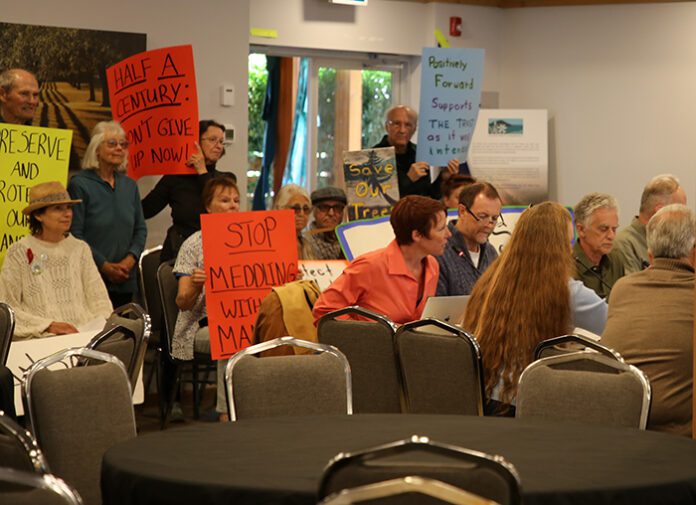As protesters gathered outside a meeting held on the most populous island within their jurisdiction, elected officials serving on Islands Trust Council (ITC) struggled with what one trustee called its status as a “structurally unsound organization.”
And for a topic not technically on the agenda, Section 3 of the Islands Trust Act — commonly called the “preserve and protect” mandate in the Trust’s foundational authority — used up an outsized amount of the parliamentary oxygen in the room during ITC’s June 18-20 meeting on Salt Spring Island.
From opening “roundtable” trustee remarks to delegations, public comments and written correspondence, it was clear islanders’ concerns over that mandate — and uncertainty about how trustee consensus on its interpretation may have been reached during a closed session in September 2023 — have survived both Executive and Governance Committee efforts to class the matter as settled.
That closed session, from which trustees emerged to eventually release multiple versions of a “consensus statement” on interpreting the mandate, has rankled open government advocates ever since — and “blowback” from islanders has led to public disagreements among trustees, disputing not only the substance of that interpretation but even whether it qualified as an interpretation at all.
“This is a hurdle we have to get over,” said ITC chair Peter Luckham. “We can’t ignore it. We need to get over it so that the public can have their answers and we can move on with the important work that we need to do — particularly around the Policy Statement.”
In October the Islands Trust released a draft “consensus statement” disclosing trustees had — reportedly through an examination of specific legal opinions — reached consensus on interpreting Section 3, notably in that the definition of “unique amenities” targeted for preservation and protection may include “housing, livelihoods, infrastructure and tourism.”
That seeming shift away from what some considered a foundational focus on protecting the natural environment and limiting growth sparked lively public comment, which in turn prompted the Trust to release a second statement in January on the “scope and meaning” of the mandate clause, “to make public the results of our discussions and share with our constituents how the current Trust Council intends to interpret our mandate, which in turn will help inform our strategic planning.”
And at trustees’ first Committee of the Whole meeting at the beginning of June, disagreements arose about whether the in-camera session produced a consensus at all — and whether there was any new direction as a result of those discussions.
Luckham told trustees last week he believed the best way forward was to have another, similar meeting — this time fully in public session.
“The only way we’re going to be able to provide this answer is to re-do that conversation,” said Luckham. “Maybe we’ll come up with a different conclusion, because we’ve certainly heard a lot of concerns from around the Trust Area.”
Bowen Island trustee Judith Gedye, who chairs the Trust’s Governance Committee, said the “blowback” from those public releases had often become personal — and she worried a broad repeat of the discussion among the entire Trust Council might not yield better results without some guidance.
“We haven’t had a chance [in the Governance Committee] to talk about where the mistakes were, and how we would improve,” said Gedye. “How do we analyze it? How do we make sure that we don’t do the same thing again?”
Gambier Island Local Trust Area trustee Joe Bernardo characterized the in-camera discussion not as a change in direction for the Trust, but rather a clarification of its current direction.
“The purpose of that whole thing was to reach an accurate understanding of what Section 3 has always meant,” said Bernardo, adding that trustees have always had “tremendous” discretion in how they interpret it.
“With respect to the general discussion about the Section 3 issue that’s come up, the communication over this — let’s face it, we’ve got to be honest with ourselves — we failed,” said Bernardo. “There’s quite a bit of suspicion that we’re up to something; I don’t think we can do much about a conspiratorial mindset, but we can be more transparent.”
To that end, Bernardo suggested any future public discussion should centre not on revisiting that interpretation, but rather whether and how trustees might simply release the legal opinions that guided trustees into that interpretation — a move which, he added, would likely require additional legal counsel on the merits and risks involved.
“The public may not agree with our conclusion,” he said, “but at least it will address the question in good faith.”
Saturna Island trustee Mairead Boland pointed to the mandate interpretation kerfuffle as emblematic of a governance structure that may have outlived its purpose.
“In 2024, [the Islands Trust] is a structurally unsound organization that cannot find its way,” said Boland. “How many local governments repeatedly seek legal opinions on the meaning of the mandate they have been given?”
Boland said it could be argued the work of the Islands Trust Act was complete by the 1990s, by which time each island had an Official Community Plan which could be used to manage growth — instead of the Trust itself having grown to where “a budget of $10 million, 65 staff and 26 trustees are required to do what is described at its core as ‘land use management’ — for a population of 30,000.”
She and other trustees echoed the sentiment of previous councils’ appeals to the Minister of Municipal Affairs for a provincial review of the structure and governance of the Islands Trust.
“We are too wounded to heal ourselves,” said Boland. “We are propping up, repairing and limping on with a governance structure whose time has passed.”
Trustees ultimately voted to add a discussion on the Section 3 mandate to September’s ITC meeting, set for Sept. 24-26 in Nanaimo.

